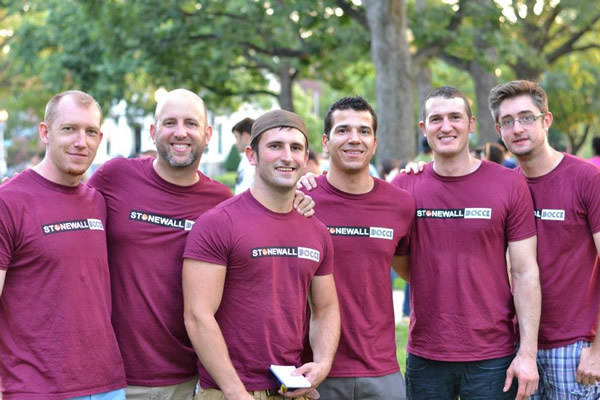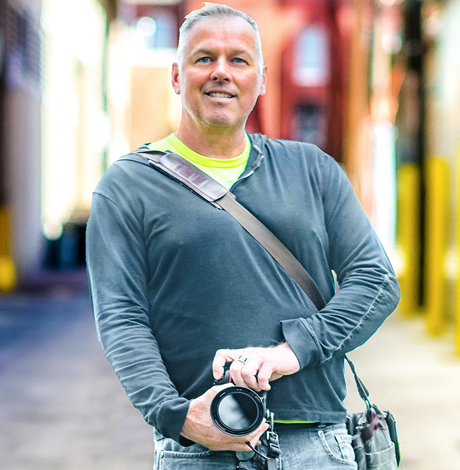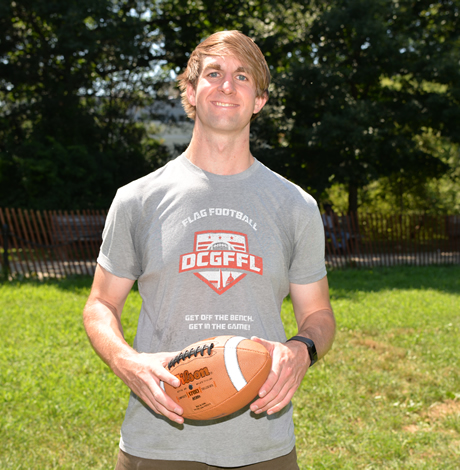Arts & Entertainment
‘Fun, philanthropy and community’
Stonewall Bocce League gearing up for fall season

Members of D.C.’s Stonewall Bocce league. (Photo courtesy Stonewall Bocce)
You only have to look at some of the names of their teams to know that the members of Stonewall Bocce are having a good time — Love is a Boccefield, Joanie loves Bocce, Low Hanging Bocces and the Andre Boccellis are just a few teams on their roster.
The Stonewall Bocce League was formed in 2011 by Melvin Thomas and Lucy Cunningham. After playing in the D.C. Bocce League, they decided to form a league for the LGBT community and its allies.
The group runs a spring league from March to May and a fall league from September to November. They play on Thursday nights at 6:30 p.m. in Logan Circle and games usually last 30 to 45 minutes.
The rules of bocce ball are relatively easy to learn. A small ball called the jack is thrown onto the court and each team has four larger balls, which are then bowled onto the court in an attempt to be closest to the jack. The team with the closest ball is the only team that can score points in any frame.
The sport of bocce ball in its present form was developed in Italy, but throwing balls toward a target is the oldest game known to mankind. As early as 5000 B.C., the Egyptians played a form of bocce with polished rocks.
The Stonewall Bocce League has become so popular that there’s a cap of 200 players that make up the 20 teams in the league. Registration for the league is $40 to $45 and free agents are welcome to register for placement on a team.
“We operate under three principles that guide all of our decisions,” says Co-Commissioner Brien Bell. “Fun, philanthropy and community.”
At the beginning of each season, all 20 teams name a local charity of their choice and then play to win money that will be donated to the chosen charity. At least 80 percent of the profits raised during the season are given to the named charities of the teams that make it to the final rounds of the league championships.

Bocce developed in Italy but has roots in some of the earliest games humans have been known to play. (Photo courtesy Wikimedia Commons)
Following league play on Thursday nights, the players often head to Nellie’s Sports Bar where they receive special prices. Another social event for the group is their mid-season karaoke contest which is another opportunity for fun and to raise additional money for charitable giving.
“I was looking at our group of players during the last season,” says Co-Commissioner Thomas. “We have an incredibly diverse mix of race, sexual orientation, gender and even players with disabilities.”
Thomas was recently honored with the “most valuable player” award at the 2013 Team D.C. Champions Awards.
The Egyptians would be proud.
Registration is open for the fall season from Monday through Wednesday (Aug. 19-21) at stonewallsports.org.

Team DC, the umbrella organization for LGBTQ-friendly sports teams and leagues in the D.C. area, held its annual Night of Champions Awards Gala on Saturday, April 20 at the Hilton National Mall. The organization gave out scholarships to area LGBTQ student athletes as well as awards to the Different Drummers, Kelly Laczko of Duplex Diner, Stacy Smith of the Edmund Burke School, Bryan Frank of Triout, JC Adams of DCG Basketball and the DC Gay Flag Football League.
(Washington Blade photos by Michael Key)




















The 2024 National Cannabis Festival was held at the Fields at RFK Stadium on April 19-20.
(Washington Blade photos by Michael Key)
















Covering the @NatlCannaFest at RFK Stadium for @WashBlade . Stop by the LGBTQ+ booth and pick up a paper if you are here. pic.twitter.com/is7hnsaPns
— Michael Patrick Key (@MichaelKeyWB) April 20, 2024
Theater
‘Amm(i)gone’ explores family, queerness, and faith
A ‘fully autobiographical’ work from out artist Adil Mansoor

‘Amm(i)gone’
Thorough May 12
Woolly Mammoth Theatre
641 D St., N.W.
$60-$70
Woollymammoth.net
“Fully and utterly autobiographical.” That’s how Adil Mansoor describes “Amm(i)gone,” his one-man work currently playing at Woolly Mammoth Theatre.
Both created and performed by out artist Mansoor, it’s his story about inviting his Pakistani mother to translate Sophocles’s Greek tragedy “Antigone” into Urdu. Throughout the journey, there’s an exploration of family, queerness, and faith,as well as references to teachings from the Quran, and audio conversations with his Muslim mother.
Mansoor, 38, grew up in the suburbs of Chicago and is now based in Pittsburgh where he’s a busy theater maker. He’s also the founding member of Pittsburgh’s Hatch Arts Collective and the former artistic director of Dreams of Hope, an LGBTQ youth arts organization.
WASHINGTON BLADE: What spurred you to create “Amm(i)gone”?
ADIL MANSOOR: I was reading a translation of “Antigone” a few years back and found myself emotionally overwhelmed. A Theban princess buries her brother knowing it will cost her, her own life. It’s about a person for whom all aspirations are in the afterlife. And what does that do to the living when all of your hopes and dreams have to be reserved for the afterlife?
I found grant funding to pay my mom to do the translation. I wanted to engage in learning. I wanted to share theater but especially this ancient tragedy. My mother appreciated the characters were struggling between loving one another and their beliefs.
BLADE: Are you more director than actor?
MANSOOR: I’m primarily a director with an MFA in directing from Carnegie Mellon. I wrote, directed, and performed in this show, and had been working on it for four years. I’ve done different versions including Zoom. Woolly’s is a new production with the same team who’ve been involved since the beginning.
I love solo performance. I’ve produced and now teach solo performance and believe in its power. And I definitely lean toward “performance” and I haven’t “acted” since I was in college. I feel good on stage. I was a tour guide and do a lot of public speaking. I enjoy the attention.
BLADE: Describe your mom.
MANSOOR: My mom is a wonderfully devout Muslim, single mother, social worker who discovered my queerness on Google. And she prays for me.
She and I are similar, the way we look at things, the way we laugh. But different too. And those are among the questions I ask in this show. Our relationship is both beautiful and complicated.
BLADE: So, you weren’t exactly hiding your sexuality?
MANSOOR: In my mid-20s, I took time to talk with friends about our being queer with relation to our careers. My sexuality is essential to the work. As the artistic director at Dreams of Hope, part of the work was to model what it means to be public. If I’m in a room with queer and trans teenagers, part of what I’m doing is modeling queer adulthood. The way they see me in the world is part of what I’m putting out there. And I want that to be expansive and full.
So much of my work involves fundraising and being a face in schools. Being out is about making safe space for queer young folks.
BLADE: Have you encountered much Islamophobia?
MANSOOR: When 9/11 happened, I was a sophomore in high school, so yes. I faced a lot then and now. I’ve been egged on the street in the last four months. I see it in the classroom. It shows up in all sorts of ways.
BLADE: What prompted you to lead your creative life in Pittsburgh?
MANSOOR: I’ve been here for 14 years. I breathe with ease in Pittsburgh. The hills and the valleys and the rust of the city do something to me. It’s beautiful, it’ affordable, and there is support for local artists. There’s a lot of opportunity.
Still, the plan was to move to New York in September of 2020 but that was cancelled. Then the pandemic showed me that I could live in Pittsburgh and still have a nationally viable career.
BLADE: What are you trying to achieve with “Amm(i)gone”?
MANSOOR: What I’m sharing in the show is so very specific but I hear people from other backgrounds say I totally see my mom in that. My partner is Catholic and we share so much in relation to this.
I hope the work is embracing the fullness of queerness and how means so many things. And I hope the show makes audiences want to call their parents or squeeze their partners.
-

 South America4 days ago
South America4 days agoDaniel Zamudio murderer’s parole request denied
-

 Maryland4 days ago
Maryland4 days agoMontgomery County police chief discusses arrest of trans student charged with planned school shooting
-

 Commentary5 days ago
Commentary5 days agoWorld ‘isn’t much different today’
-

 Theater4 days ago
Theater4 days ago‘Amm(i)gone’ explores family, queerness, and faith










